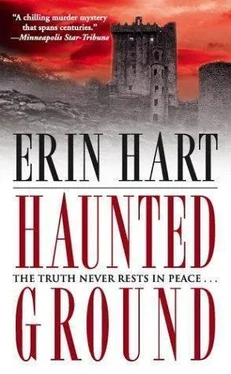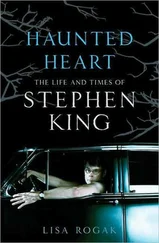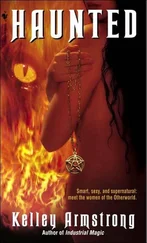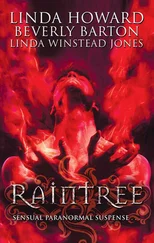“I wanted to ask you—”
“If you’d still be interested—”
Cormac insisted that she speak first.
“I was going to ask if you’ve decided about going back to Dunbeg,” she said.
“That’s just what I was about to tell you. I am going back. I phoned Hugh Osborne this evening. I’ve a couple of things to do tomorrow morning, then I’m heading out there in the afternoon.”
“And did you find someone to help you?”
“I thought I had a volunteer. Unless you’ve changed your mind.”
“Oh no, not at all. I have to finish up in the lab tomorrow, but I could probably make it out there by about six.” She stopped thinking aloud and looked directly at him. “Thanks, Cormac.”
“Not at all. Thank you for the song.” A small gust of wind blew Nora’s hair across her eyes. Without thinking, he reached up to brush it away, then let his fingers rest against the soft curve of her cheek. He was startled when she twisted away from his touch.
“No,” she said. “Please don’t.”
“I’m sorry, Nora—”
“It’s not you, Cormac—please don’t think that. It’s just—it’s just that I’m a coward.” She finally looked at him again. “I hope you still want my help tomorrow.”
“Yes, of course I do.” She studied him thoughtfully for a moment longer, then climbed into her car and drove off down the empty street. Cormac began walking briskly back to his own car, realizing that he’d no reason at all to feel hopeful. It had been a most definite rebuff. But he had gotten to hear her say his name again—twice.
Book Two
WOUND FOLLOWS WOUND
Wound follows wound that nothing be wanting to fill up the cup of sufferings. The few Catholic families that remain were lately deprived by Cromwell of all their immovable property, and are all compelled to abandon their native estates, and retire into the province of Connaught.
—Father Quinn, a Jesuit priest, writing to the Vatican from his hiding place in the mountains of Ireland, 1653
By the time Cormac crossed over the Galway border at Portumna, the day-long drizzle had turned to lashing rain. The roads and ditches had melted into a watery blur of gray and green, and the poor visibility, along with the steady pulse of the wipers and the random drumbeat of the rain on the roof of the car, had begun to wear on his nerves. The journey was nearly over, he told himself, only ten miles farther. He’d been plagued by second thoughts throughout the trip west, knowing that he’d phoned Osborne for purely selfish reasons, because it meant a chance to spend more time with Nora Gavin. It was too late now to be sorry he’d agreed to the job.
He’d felt at a loss in the weeks since Gabriel’s death—uneasy, and unable to concentrate. He remembered the old man’s hand at rest on that pad of paper. When the ambulance drivers had taken Gabriel’s body away, he’d stayed on, studying the blot of ink that obscured those final words. Of all the indelible details of that strange tableau, this was the image that haunted him. What, if anything, had been in the old man’s mind the moment his pen had refused to move? Did he suffer pain? Did he understand what was happening, or was conscious thought simply swept away by the sudden insult to his brain?
They had been together at the site of so many burials, never venturing to speak about their own mortality. Gabriel must have thought about it. A man couldn’t work so intimately with the meager remains of the dead without contemplating his own passing. But they had never spoken of it. Gabriel must have shared those confidences with his wife; he had been cremated, and there was no religious service, only a memorial gathering at their home in Dublin. The McCrossans had no children, but sitting in their front room among the old man’s neighbors, old school friends, colleagues from the university, Evelyn’s friends from the world of writing and publishing, Cormac had realized how small his own circle of acquaintances really was.
No one had gained admittance to his unguarded thoughts the way Gabriel McCrossan had. Cormac had in a sense packed his father’s bags even before anyone knew that Joseph Maguire was actually leaving Ireland for good. That place in his heart had remained empty until he had met Gabriel. With only one survey course in archaeology behind him, Cormac had signed on for the summer as one of a dozen or so students helping with the excavation of a 2,500-year-old bog road.
McCrossan had had a habit of addressing the students before setting them to work. They’d stand before him quietly, fiddling with their tools, eager to begin. He’d pace back and forth in front of them, just as he would have done in a lecture hall.
“Now it may seem to you,” he’d say, “that we’re only uncovering a few old waterlogged pieces of timber. But what we’re really after is the thinking of the people who put these objects in this place. Their beliefs, their ideals, their intentions are all present with these sodden old logs—along with information about the kinds of tools they used to fell the trees, or to bind them into a trackway, the system of labor it took to accomplish this—and these, ladies and gentlemen, are some of the only concrete clues we have as to what their whole society and way of life was like. I invite you to become the discoverers of what lies in this hallowed ground.”
Cormac remembered voicing his frustration to Gabriel at the slow pace of their work; there was always too little time, too little money and manpower to do the work as it should be done. The ground was teeming with treasure, and vital knowledge of the past was being destroyed every day.
“Aye, certainly it is. You’ll get disillusioned very quickly if you begin thinking like that,” Gabriel had said. “Patience is the first requirement in this job. It’s best to remind yourself to just keep digging.”
At Clonco Bridge, Cormac turned off the main route onto the narrow road that ran past Drumcleggan Bog and Bracklyn House. The rain was still pelting down hard. The front gateway at Bracklyn resembled a graceful set of Gothic chess pieces, with arched doorways to either side of the main gate, and ravenlike birds topping each of the four capitals. A nineteenth-century add-on, he guessed, as he turned the jeep down the long gravel drive; the gate’s original purpose was assuredly more for ostentation than for defense.
The deep wooded area around the estate’s perimeter gave way almost immediately beyond the gate to a circular drive at the front entrance of the house. Within the circle stood a formal geometric garden, separate triangles of rosebushes enclosed by a miniature box hedge. Though the place did not seem uncared for, exactly, the grass was unevenly trimmed and overrun with clover and daisies, and the strict edges of the formal garden had been noticeably softened by time. This approach had once enjoyed better days, and Cormac sensed the effort it took to keep the wildness at bay.
He parked a short distance from the house along the curve of the drive, and sat in the jeep for a moment to see whether the rain might let up. Bracklyn House itself was a well-proportioned Jacobean mansion, much larger than he had imagined upon his first glimpse of it from the road. The building’s original function as fortress was still evident, from the thickness of the stone walls and the firing holes in its four-square flanking towers. But the profusion of windows also told him that this house had probably been built sometime in the early seventeenth century, a short period of peace when Ireland’s aristocracy began forsaking their thick-walled towers in favor of houses that offered grand vistas of their surrounding lands. Their optimism came about a century too soon, however; some of them would have done better to keep their easily defensible fortresses in the face of the invading English. The country was littered with the burned-out ruins of such houses.
Читать дальше











